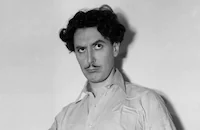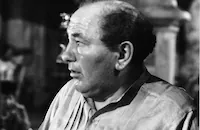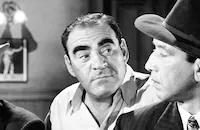I Wonder Who's Kissing Her Now?
Brief Synopsis
Cast & Crew
Lloyd Bacon
June Haver
Mark Stevens
Martha Stewart
Reginald Gardiner
Lenore Aubert
Film Details
Technical Specs

Synopsis
In New Jersey at the turn of the century, aspiring songwriter Joseph E. Howard demonstrates pipe organs and lives with his guardian, John McCullem, and McCullem's young niece Katie, whom he regards as a sister. One day, Joe takes Katie to a musical show in New York to hear vaudeville star Lulu Madison perform a song he has just sold to her. Backstage, Joe introduces himself to Lulu and she flirtatiously invites him to bring his next song to her personally. Afterward, Joe discovers that Lulu has received sole credit for his composition and angrily goes to confront her. After placating Joe, Lulu invites him to her hotel suite. Sensing that Joe has a fount of songs in him, Lulu asks him to join her on the road as her piano player. When Joe returns home at dawn and tells Katie that he is leaving with Lulu, Katie cautions him to be wary and begs to go along. Refusing her request, Joe asks her to say goodbye to Uncle John, packs his bags and departs. As Joe tours with Lulu, he steadily gains popularity and soon Lulu grants him his own specialty within her act. Katie follows Joe to Philadelphia, and when he insists that she return home, she melodramatically lies that Uncle John has died, and hence, she is now homeless. Jealous of Katie, Lulu objects to her traveling with the show, but Joe persuades her to reconsider. On the road, Katie deliberately antagonizes Lulu about her age, her weight, and encourages Joe to write ballads against Lulu's wishes. In Cleveland, Lulu's manager, Jim Mason, learns that well-known Chicago theater managers Karl and Kassel have come to see Joe. Katie then overhears Jim warn Lulu that Joe is in danger of eclipsing her act. When Lulu instructs Joe to eliminate his specialty, Katie retaliates by sabotaging Lulu's costume, thus allowing Joe time to perform his song for the theater owners. Joe's composition is greeted by wild applause, and Lulu, furious, fires him. Upon learning of Lulu's chicanery, Joe demands the royalties from all his songs and then meets with Karl and Kassel. When the producers advise Joe to find another partner and build a reputation, Katie teams with Joe and they work their way up the vaudeville circuit to the Karl and Kassel theater in Chicago. There, Joe meets headliner Fritzi Barrington, an admirer of his songs. Joe is smitten by the glamorous Fritzi, who promises to promote his compositions. Consequently, when playwright Will Hough approaches Fritzi with an offer from her former suitor, Martin Webb, to star in a new show he is producing, Fritzi agrees on the condition that Joe write the songs. Hough, who has actually never met Webb, then introduces himself to Webb and informs him that he has engaged Fritzi to star in a musical, and Webb, who is still in love with Fritzi, agrees to finance it. As the show goes into rehearsal, however, Webb finds Fritzi and Joe embracing in her dressing room and withdraws his financial support. Joe then sells all the rights to his songs in exchange for the funds to finance the show. As Fritzi performs on opening night, Katie imagines herself as the star. The show is a hit, and Joe goes to New York to sign a lease on a Broadway theater. There, he meets an old friend, who tells him that Uncle John is still alive. When Joe visits his guardian, Uncle John shows him letters Katie has written, describing her success on stage. Upon returning to Chicago, Joe finds Katie preparing to step into Fritzi's part and learns that Fritzi has left the show to marry Webb. Feeling betrayed, Joe accuses Katie of antagonizing Fritzi into leaving and cancels the show. Joe then abruptly departs to tour the country, playing at honky-tonks along the way. Some time later, Joe arrives at the San Francisco train station to find the town whistling one of his melodies, which had remained unpublished because the lyrics had always eluded him. After booking passage to Alaska, Joe tracks the tune to the Pat O'Dare show, on stage at a local theater. There, Joe is surprised to find Hough, who informs him that he is getting married and has reopened the show after making Joe a full partner. Hough reveals that he and his friend, Frank Adams, have written the lyrics to Joe's elusive tune, "I Wonder Who's Kissing Her Now," which Katie, using the name Pat O'Dare, is performing. Spotting Joe in the wings, Katie rushes off stage to greet him. In her dressing room, Joe informs Katie that he is sailing for Alaska that night. Katie replies that she is planning to marry Hough, but passionately kisses Joe. As Joe and Katie emerge from the dressing room, Joe tells Hough that he is in love with Katie. When Hough's true fiancée appears, Joe realizes that Katie has deceived him once again.

Director

Lloyd Bacon
Cast

June Haver

Mark Stevens

Martha Stewart

Reginald Gardiner

Lenore Aubert

William Frawley

Gene Nelson
Truman Bradley
George Cleveland
Harry Seymour
Lewis L. Russell
John "skins" Miller
Lew Hearn

Eve Miller
Florence O'brien

Emmett Vogan

Charles Judels
Milton Parsons
Dewey Robinson
John Merton
Robert Emmett Keane
John Sheehan
Sam Mcdaniel

John Arledge
Steve Olsen
Frank Scannell
Harry Cheshire
Charles Marsh
Joe Whitehead
Dick Rush
Perry Ivins
Herbert Heywood
Claire Richards
Antonio Filauri
Eddie Dunn

Ralph Dunn
Almira Sessions
Merrill Rodin
Sam Ash
Eddie Borden
Donald Kerr
George Gramlich
Bruce Cameron
Walter Pietila
Ray Spiker
Joseph Bernard
Charles Meakin
Broderick O'farrell
Bill Murphy
Alice Mock
Henry Hall
Billy Green
Dick Ryan
Walter Merrill
George Lloyd
Ricki Van Dusen
Elaine Langan
Donna Hamilton
Mary Jane Shores
Marjorie Holliday
Jean O'donnell
Savona King
Tom Stevenson
George Taylor
Wayne Tredway
William Bailey
Nolan Leary
Red Cherry
Crew
Frank R. Adams
James Basevi
Joe Behm
Vincent P. Bryan
Bonnie Cashin
Melville Crossman
Hugh Cummings
Catherine Chisholm Cushing
Richard Day
Leonard Doss
Ida Emerson
Lewis R. Foster
Don Greenwood
E. P. Heath
Roger Heman
Charles Henderson
Charles Henderson
Will M. Hough
Joseph E. Howard
George Jessel
George Jessel
George Jessel
Emmerich Kalman
Natalie Kalmus
Arthur L. Kirbach
R. A. Klune
Charles Le Maire
Boris Leven
Paul Lincke
Thomas Little
Louis Loeffler
Alfred Newman
Ben Nye
Harold Orlob
Maurice De Packh
Ernest Palmer
Hermes Pan
Lilla Gayley Robinson
Walter M. Scott
Fred Sersen
Andrew B. Sterling
Marion Turk
Harry Von Tilzer
Joseph C. Wright

Film Details
Technical Specs

Quotes
Trivia
Notes
The working title of this film was Hello, My Baby. The film begins with the following foreword signed by producer "Georgie" Jessel: "This is a story based on incidents from the early life of that ageless American troubadour, Joseph E. Howard, who wrote and sang the nation's songs at the turn of the century. Caring little for money and less for fame, Joe was a rolling stone that left a trail of melody from coast to coast and wherever he went there was sure to be a lovely face, a trim ankle and the fragrant memory of melodies that can never be forgotten, gad, what a life!" The film was conceived as a vehicle for the music of composer-singer-vaudeville star Joesph E. Howard (1867-1961), rather than as a strict biography. Howard ran away from home as a young boy, made his debut in vaudeville at the age of ten or eleven, and went on to author over 525 songs and 22 stage musicals. Together with Frank Adams and Will Hough, he wrote 15 popular musical shows. The trio wrote the song "I Wonder Who's Kissing Her Now" in 1906. Howard was married at least six times.
According to materials contained in the Twentieth Century-Fox Produced Scripts Collection, located at the UCLA Arts-Special Collections Library, Fred Finklehoffe and George Jessel worked on various outlines, screenplays and stories for the film between June and September 1945. Darryl F. Zanuck, the head of production at the studio, who is credited on various drafts as Melville Crossman, hated their work and insisted on a total rewrite. In an October 11, 1945 memo, Zanuck suggested that the story line include a little girl who grows up to love "Joe" and proposed June Haver for the role. Other materials in the Scripts Collection disclose that the studio bought the rights to a story written by Bill Delany titled I Wonder Who's Kissing Her Now. In a letter dated August 22, 1945, studio attorney George Wasson stated that the story was acquired to eliminate Delaney's claim that he owned a 25% interest in the project, and that little or none of his material was actually used.
Hollywood Reporter news items yield the following information about this production: A June 1946 item notes that Celeste Holm, who was originally slated to play the role of "Lulu Madison," withdrew from the cast to take maternity leave. A July 1946 item adds that Linda Darnell rejected the role of "Katie" because she felt it was ill-suited for her. Although Hollywood Reporter production charts place Reed Hadley in the cast, his appearance in the released film has not been confirmed. August 1946 news items note that acrobatic tumbling clowns George Suzanne and Loren Riebe were signed to perform a specialty act and Ted Doner was hired for a supporting role, but their appearance in the released film has not been confimred. This picture marked the screen debut of Gene Nelson, a former dancing skater in Sonja Henie's ice troupe.
Materials contained in the Twentieth Century-Fox Records of the Legal Department, also located at UCLA, reveal that the studio went to great effort to obtain the rights to every song performed in the film and procured privacy waivers from Howard and his various wives. Hough refused to sign a waiver until the studio agreed to credit him as the lyric writer onscreen as well as portray his character as the writer of Howard's lyrics. According to a letter dated April 26, 1945, the studio wanted to include Howard's song "Somewhere in France There's a Lily," but were deterred from doing so because of problems securing the rights. According to Hollywood Reporter and Hollywood Citizen-News news items, in July 1947, composer Harry Orlob sued the studio and Howard, claiming that he wrote the music for the song "I Wonder Who's Kissing Her Now," as well as approximately 100 other songs credited to Howard. The suit was settled when the defendants agreed to give Orlob credit for composing the tune.












